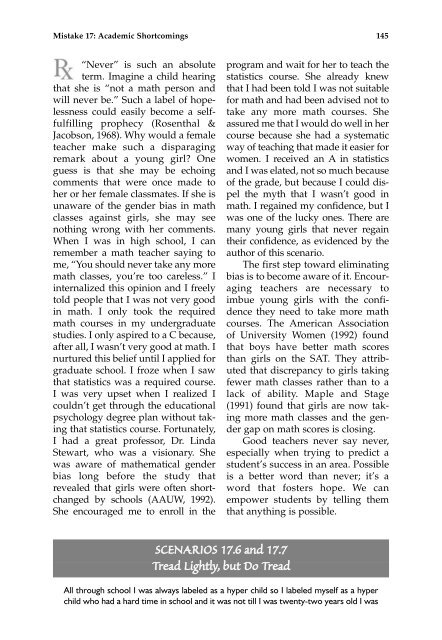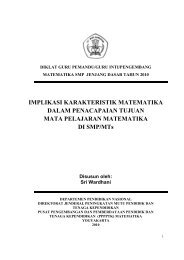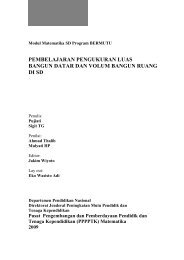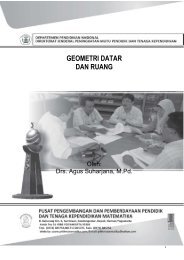25 Biggest Mistakes Teachers Make and How to Avoid Them
25 Biggest Mistakes Teachers Make and How to Avoid Them
25 Biggest Mistakes Teachers Make and How to Avoid Them
Create successful ePaper yourself
Turn your PDF publications into a flip-book with our unique Google optimized e-Paper software.
Mistake 17: Academic Shortcomings<br />
“Never” is such an absolute<br />
term. Imagine a child hearing<br />
that she is “not a math person <strong>and</strong><br />
will never be.” Such a label of hopelessness<br />
could easily become a selffulfilling<br />
prophecy (Rosenthal &<br />
Jacobson, 1968). Why would a female<br />
teacher make such a disparaging<br />
remark about a young girl? One<br />
guess is that she may be echoing<br />
comments that were once made <strong>to</strong><br />
her or her female classmates. If she is<br />
unaware of the gender bias in math<br />
classes against girls, she may see<br />
nothing wrong with her comments.<br />
When I was in high school, I can<br />
remember a math teacher saying <strong>to</strong><br />
me, “You should never take any more<br />
math classes, you’re <strong>to</strong>o careless.” I<br />
internalized this opinion <strong>and</strong> I freely<br />
<strong>to</strong>ld people that I was not very good<br />
in math. I only <strong>to</strong>ok the required<br />
math courses in my undergraduate<br />
studies. I only aspired <strong>to</strong> a C because,<br />
after all, I wasn’t very good at math. I<br />
nurtured this belief until I applied for<br />
graduate school. I froze when I saw<br />
that statistics was a required course.<br />
I was very upset when I realized I<br />
couldn’t get through the educational<br />
psychology degree plan without taking<br />
that statistics course. Fortunately,<br />
I had a great professor, Dr. Linda<br />
Stewart, who was a visionary. She<br />
was aware of mathematical gender<br />
bias long before the study that<br />
rev ealed that girls were often shortchanged<br />
by schools (AAUW, 1992).<br />
She encouraged me <strong>to</strong> enroll in the<br />
SCENARIOS 17.6 <strong>and</strong> 17.7<br />
Tread Lightly, but Do Tread<br />
145<br />
program <strong>and</strong> wait for her <strong>to</strong> teach the<br />
statistics course. She already knew<br />
that I had been <strong>to</strong>ld I was not suitable<br />
for math <strong>and</strong> had been advised not <strong>to</strong><br />
take any more math courses. She<br />
assured me that I would do well in her<br />
course because she had a systematic<br />
way of teaching that made it easier for<br />
women. I received an A in statistics<br />
<strong>and</strong> I was elated, not so much because<br />
of the grade, but because I could dispel<br />
the myth that I wasn’t good in<br />
math. I regained my confidence, but I<br />
was one of the lucky ones. There are<br />
many young girls that never regain<br />
their confidence, as evidenced by the<br />
author of this scenario.<br />
The first step <strong>to</strong>ward eliminating<br />
bias is <strong>to</strong> become aware of it. Encour -<br />
aging teachers are necessary <strong>to</strong><br />
imbue young girls with the confidence<br />
they need <strong>to</strong> take more math<br />
courses. The American Association<br />
of University Women (1992) found<br />
that boys have better math scores<br />
than girls on the SAT. They attributed<br />
that discrepancy <strong>to</strong> girls taking<br />
fewer math classes rather than <strong>to</strong> a<br />
lack of ability. Maple <strong>and</strong> Stage<br />
(1991) found that girls are now taking<br />
more math classes <strong>and</strong> the gender<br />
gap on math scores is closing.<br />
Good teachers never say never,<br />
especially when trying <strong>to</strong> predict a<br />
student’s success in an area. Possible<br />
is a better word than never; it’s a<br />
word that fosters hope. We can<br />
empower students by telling them<br />
that anything is possible.<br />
All through school I was always labeled as a hyper child so I labeled myself as a hyper<br />
child who had a hard time in school <strong>and</strong> it was not till I was twenty-two years old I was





